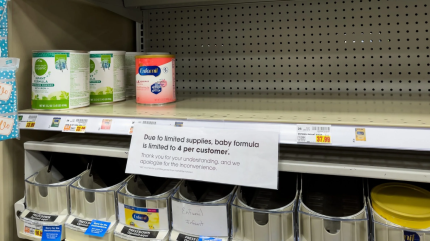
The US Federal Trade Commission (FTC) has called on national regulators to re-evaluate policies to boost competition and resilience in the national baby formula market.
In a report released this week, the FTC examined the reasons behind infant formula shortages in the US that took hold in 2022.

Discover B2B Marketing That Performs
Combine business intelligence and editorial excellence to reach engaged professionals across 36 leading media platforms.
It found the US infant formula market has been dominated by “relatively few manufacturers” over the past two decades.
These include Abbott Laboratories, Mead Johnson, a subsidiary of Reckitt Benckiser Group, Nestlé and Perrigo.
Abbott which produces the Similac formula brand, owned a 27% share of the market in 2022. It was the largest producer of infant formula prior to the closure of its facility in Sturgis, Michigan in 2022.
In December 2022, Nestlé sold its US and Canada rights to the Gerber Good Start formula brand to Perrigo, as well as its manufacturing plant in Wisconsin.

US Tariffs are shifting - will you react or anticipate?
Don’t let policy changes catch you off guard. Stay proactive with real-time data and expert analysis.
By GlobalDataThe report also highlighted that the volatility of its “highly concentrated” market is particularly evident in specialist formula, where the top brands in the segment were all produced by two companies in 2022, Abbott and Mead Johnson.
This put infants requiring the special formulas at risk during the case of recalls, which occurred in 2022 for Abbott’s brands Similac Alimentum and Elecare.
The FTC has also asked regulators to consider the risks associated with single-supplier contracts with the US Department of Agriculture’s Women, Infants and Children (WIC) programme, which provides free formula to low-income families.
“While these contracts can significantly lower overall WIC Program costs, this approach comes with certain trade-offs”, the report said.
These include increasing the risk of states relying on a single supplier, the FTC argues, as well as the likelihood of collusion between companies. It was also found to create “barriers” to competition and increase “the risk of unintended spillover effects on the non-WIC infant formula market” and the individuals enrolled in the programme.
In its public submissions, the FTC also noted that several commentators said they thought the FDA’s current requirements for infant formula production proved “a challenge for expanding the supply” of the product. The rules had “increased costs to enter the market,” closing the market in “even further” and “decreasing overall manufacturing capacity”, blocking an potential for innovation in the sector.
In a statement, US attorney and commissioner of the FTC Rebecca Kelly Slaughter, said: “This report underscores the heightened dangers of market consolidation in critical sectors.”
She added the study “makes clear that the factors that contributed to the 2022 formula shortage are complex and continue to characterize America’s infant formula markets today.
“As a result, the Commission’s assessment of the competition impacts of concentration and single-supplier contracting makes a valuable contribution to ongoing policy analyses that seek to make infant formula markets more resilient in the future.”
The FTC was called to investigate the US infant-formula market in the US in 2022, following a supply crisis sparked by the closure of Abbott’s site in Sturkis, which re-opened four months after the contamination scare.
In May 2023, the regulator announced it would be investigating whether baby formula companies had colluded on bids for the WIC programme state contracts.
In 2022, the US-based pharmacy group Walgreens Boots Alliance had also been accused of raising prices on infant formula by New York Attorney Letitia James. The retailer reached a settlement on the case earlier this month.
Across the Atlantic, the UK competition regulator said it would examine the country’s infant formula market after finding prices in the sector had jumped in recent years.



